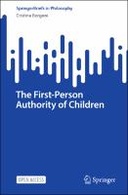Explore

The First-Person Authority of Children
Cristina Borgoni
2025
0 Ungluers have
Faved this Work
Login to Fave
This is an open access book that addresses how we treat others and, in particular, infants and children, with first-person authority. We respond to people’s first-person authority when we give our interlocutor’s communication of their mental states more significance in establishing their thoughts, desires, and feelings than if another person were to report those mental states for them. But what happens when our interlocutors are infants and children? Increasingly, practices of responsive childrearing ascribe first-person authority to very young children. Despite this tendency, philosophy seems to be one step behind. The accepted view is one in which first-person authority has its locus in linguistic expressions of one’s self-knowledge. This is an over-intellectualized conception, however, that consequently tends to exclude children. By combining philosophical resources with empirical findings about the onset of human communication, play, and our nature as social beings, this text advances a non-intellectualized, anti-individualist, and non-adult-centered view of first-person authority. This is a view that both accommodates our daily experiences and provides material for advancing the philosophical debate around the phenomenon in an enriched and more inclusive way.
This book is included in DOAB.
Why read this book? Have your say.
You must be logged in to comment.
Rights Information
Are you the author or publisher of this work? If so, you can claim it as yours by registering as an Unglue.it rights holder.Downloads
This work has been downloaded 11 times via unglue.it ebook links.
- 11 - pdf (CC BY-NC-ND) at OAPEN Library.
Keywords
- epistemology and children
- expression and self knowledge
- first person knowledge
- first-person authority
- implicit bias and philosophy
- onset of communication
- personhood and philosophy
- personhood of children
- philosophy of mind and children
- second person knowledge
- self interpretation
- self-knowledge and philosophy
- social cognition
- social play and philosophy
- thema EDItEUR::J Society and Social Sciences::JM Psychology::JMC Child, developmental and lifespan psychology
- thema EDItEUR::Q Philosophy and Religion::QD Philosophy::QDT Topics in philosophy::QDTK Philosophy: epistemology and theory of knowledge
- thema EDItEUR::Q Philosophy and Religion::QD Philosophy::QDT Topics in philosophy::QDTM Philosophy of mind
- third person knowledge
Links
DOI: 10.1007/978-3-031-83999-3Editions

